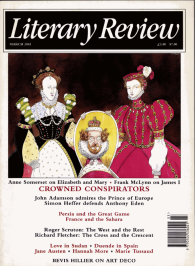John Adamson
A Fine Ligne
Prince of Europe: The Life of Charles-Joseph De Ligne, 1735-1814
By Philip Mansel
Weidenfeld & Nicolson 384pp £25
THE HOLY ROMAN Empire, Voltaire famously (and inaccurately) remarked, 'was neither holy, nor Roman, nor an empire'. As a put-down, it could hardly have been more successful. For while most schoolboys can tell you about the Third Reich, and a select few can even identify the Second (of 1871-1918), almost none have the slightest idea about the First - ironically, the only one of the three that I really did 'last for a thousand years', until its dissolution at the hands of Napoleon in 1806. If there is a single reason why we English, habituated for centuries to the constitutional simplicities of our nation-state, fail to understand Continental thinking on the 'European project', it is our almost total ignorance of this complicated, but extraordinarily successful, institution: a maze of 111 and partial sovereignties that provided a unified juridical framework for much of Europe - from Brussels to Berlin, the Adriatic to the Baltic - throughout most of the pre-Napoleonic millennium.
For a glimpse of its complexity, and of its centrality to European life. there is hardly a better face to start than Philip Mansel's fine new biography of one of its most colourful and rakish grandees: Charles-Joseph, seventh Prince de Ligne. Raconteur, wit, seducer, and would-be counsellor of kings, Ligne conquered

Sign Up to our newsletter
Receive free articles, highlights from the archive, news, details of prizes, and much more.@Lit_Review
Follow Literary Review on Twitter
Twitter Feed
The son of a notorious con man, John le Carré turned deception into an art form. Does his archive unmask the author or merely prove how well he learned to disappear?
John Phipps explores.
John Phipps - Approach & Seduction
John Phipps: Approach & Seduction - John le Carré: Tradecraft; Tradecraft: Writers on John le Carré by Federico Varese (ed)
literaryreview.co.uk
Few writers have been so eagerly mythologised as Katherine Mansfield. The short, brilliant life, the doomed love affairs, the sickly genius have together blurred the woman behind the work.
Sophie Oliver looks to Mansfield's stories for answers.
Sophie Oliver - Restless Soul
Sophie Oliver: Restless Soul - Katherine Mansfield: A Hidden Life by Gerri Kimber
literaryreview.co.uk
Literary Review is seeking an editorial intern.